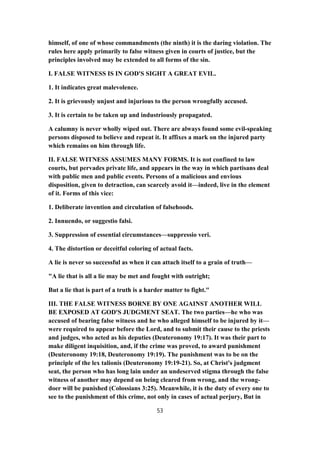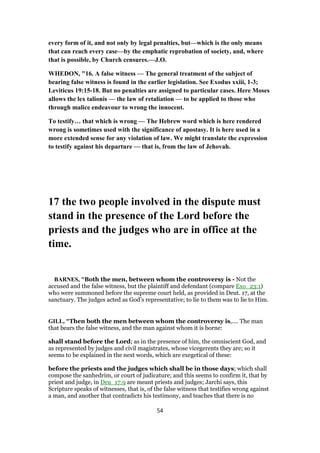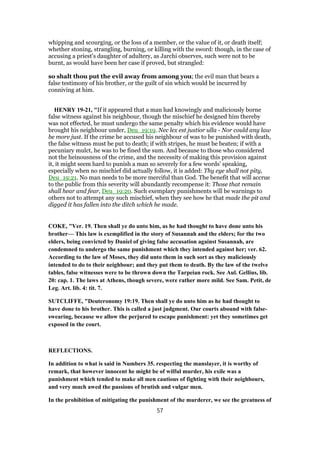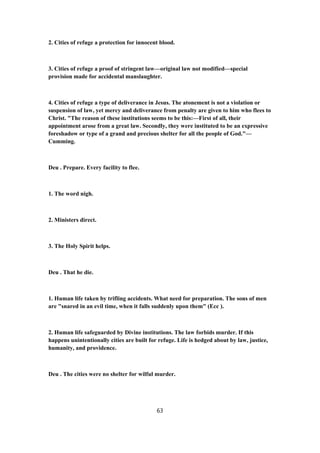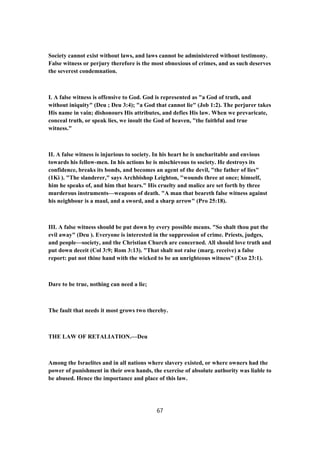The document discusses Deuteronomy 19, focusing on the laws surrounding cities of refuge for unintentional manslayers in Israel. Moses presents instructions for designating additional cities of refuge after the conquest of the West Jordan territory, emphasizing the importance of protecting human life and differentiating between accidental killing and murder. It highlights the need for well-maintained roads to ensure accessibility to these cities, with unique measures for maintaining the sanctity of life as prescribed by divine law.
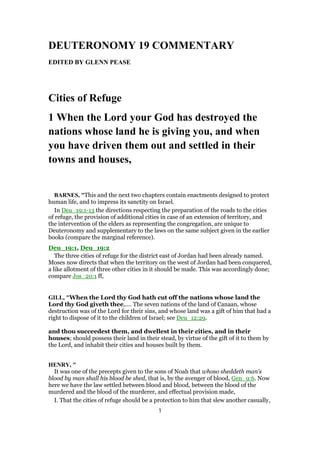


![wealth" of whatever kind would recognize God as the Giver in such a manner as that
indicated here. Such patterns as these are essentially Mosaic. The reprobate priesthood
of Israel of any century, particularly that period of Israel's history where the critical
community would like to find the "sources of the Pentateuch," was utterly incapable of
such devout terminology as that found here. The Christian should ever bear in mind
that God Himself cursed that reprobate priesthood in Malachi, and, if that priesthood
had possessed a single ounce of the pure devotion indicated here, such a thing would
never have occurred!
Oberst, quoting J. W. McGarvey, pointed out that:
"The first command on this subject (cities of refuge) is in Numbers 35, where the order
to appoint cities of refuge is given. There the number of cities was placed at six, and the
general laws for their use were announced, but the names of the cities were not given.
Next, in Deuteronomy 4:42-45, following the conquest of Trans-Jordan, Moses named
the three cities eastward from that river, and their names were given. Then in this
passage (Deuteronomy 19:1-13), Moses directed that after they had possessed the
territory west of Jordan, three other cities should be appointed on that side. This was
not to be done until after the conquest of that part of Canaan. Note particularly the
limitation imposed by the word "When" that stands at the head of this chapter; and
observe that it contrasts sharply with the dramatic "if" at the head of Deuteronomy
19:8.[1]
As is so frequently true in the Sacred Writings, each additional mention of almost any
subject results in additional information, and here it is the order to "prepare the way"
which appears for the first time. Jamieson tells us that:
"The roads leading to the cities of refuge were to be kept in good condition, and all the
brooks and rivers spanned by good bridges. The width of the roads was to be 32 cubits
(about 48 feet), with signs at every crossroads indicating the direction of the nearest city
of refuge, with the inscription Mekeleth, Mekeleth, `refuge, refuge.'"[2]
One cannot fail to be astounded at the flat declaration that these cities of refuge were in
any manner whatever an extension of the asylum often associated with pagan altars in
antiquity. Wright, for example, stated that "Exodus 21:12-14 specifies that such asylum
shall be established and infers that the altar ... was the place to which the manslayer
should go."[3] Let any thoughtful person read Exodus 21:12-14, and he will find that
such interpretations are TOTALLY IN ERROR. There God promised "a place" to
which the manslayer might go, but it was not the altar of God. Wright went on to
"prove" his false interpretation by mentioning the cases of Adonijah (1 Kings 1:50) and
Joab (1 Kings 2:28-34).
But neither of those men found any asylum whatever at God's altar! Both knew they
were guilty, therefore they did not flee to any city of refuge as God commanded (and as
was done by Abner, 2 Samuel 3:27), but they both tried to rely upon the ancient pagan
superstition regarding altars, but it did NOT work. Both were slain for their murders.
Wright's statement that the altar in Jerusalem served this purpose during the days of
the united monarchy is simply NOT true. "The law of Moses, instead of making the
4](https://image.slidesharecdn.com/deuteronomy19commentary-160203031943/85/Deuteronomy-19-commentary-4-320.jpg)
![altar an asylum for the manslayer, positively forbids its use as such ... In this instance,
in provision of God's law has been misrepresented and its meaning reversed, in order to
make out a contradiction with another arrangement which the law actually provided
for in promise. Scarcely anything could be more reprehensible."[4]
Of course, Wright in the instance cited above, is merely quoting, apparently without
thinking it out, the wild and irresponsible charges of the critical scholars two or three
generations ago, not knowing perhaps that the believing community graduated from
that kind of exegesis a long time ago. It is a pity that many modern commentators still
parrot the postulations of men in the eighteenth century, such as Driver and Smith,
noted critics of that period. Driver stated that, "In Exodus 21:13, the asylum for the
manslayer is Jehovah's altar."[5] W. Robertson Smith stated that, "The asylum for the
manslayer in Exodus 21:12-14 is Jehovah's altar."[6] Of course, they were wrong, and
nothing has ever happened that can change that!
COKE, "Ver. 1. When the Lord thy God, &c.— Moses, having pressed upon the people
the great commandment of loving God with all the heart, now proceeds to remind them
of other precepts belonging to the second table, though not in an exact manner, nor
without interspersing some ceremonial matters. He begins with what concerns that
principal part of our neighbour's property, his life.
BENSON, "Deuteronomy 19:1. From enforcing the laws enacted against idolatry, and
calculated to preserve and promote the purity of divine worship, Moses now proceeds to
inculcate some important duties belonging to the second table, but not in any exact
order, nor without interspersing some precepts respecting ceremonial matters. He
begins with some regulations appointed to secure the preservation of the most
important part of the property of a fellow- creature, his life.
CONSTABLE, "Manslaughter 19:1-13
God revealed the law concerning how the Israelites were to deal with manslayers
earlier (cf. Numbers 35:9-34). In Israel this kind of crime was a domestic rather than a
law court matter; families were to deal with it rather than the courts. The instructions
given here urge application of this law and explain the need for three more cities of
refuge west of the Jordan River. Moses had already designated three towns on the east
side of the Jordan (Deuteronomy 4:41-43). The provision of cities of refuge taught the
Israelites how important life is to God. The cities of refuge were conceptually extensions
of the altar in the tabernacle courtyard as places of asylum. [Note: Kline,
"Deuteronomy," p. 181.]
"The extension of the power of Israel to the Euphrates under David and Solomon, did
not bring the land as far as this river into their actual possession, since the conquered
kingdoms of Aram were still inhabited by the Aramaeans, who, though conquered,
were only rendered tributary. And the Tyrians and Phoenicians, who belonged to the
Canaanitish population, were not even attacked by David." [Note: Keil and Delitzsch,
3:398. Cf. Craigie, The Book . . ., p. 267.]
5](https://image.slidesharecdn.com/deuteronomy19commentary-160203031943/85/Deuteronomy-19-commentary-5-320.jpg)

![times, but the genuine language of Moses. What later writer would have thought of
adding it?
(10) That innocent blood be not shed—i.e., the blood of the manslayer who can find no
refuge, and yet is no murderer.
(11) But if any man hate his neighbour, and lie in wait for him.—Rashi’s comment upon
this is in the spirit of St. John: “By way of hatred he comes to lying in wait: and hence it
has been said, when a man has transgressed a light commandment, that he will end by
transgressing a greater. Therefore when he has broken the commandment, Thou shalt
not hate, he will end by coming to bloodshed.” What is this but “He that hateth his
brother is a murderer”?
(12) Deliver him into the hand of the avenger of blood.—There is as yet no idea of a
public trial and execution, which belongs to a more advanced stage of civilisation than
this.
(13) Shalt put away.—Literally, consume, or, as it were, burn out.
HAWKER, "This is a very sweet chapter if read under the HOLY GHOST's teaching,
and spiritually considered as leading to JESUS. And I take occasion here again in the
opening of it to remind the reader once more, that it was of JESUS Moses wrote. If the
reader will consult Exodus 21:13. he will there find, GOD'S gracious promise
concerning his merciful provision for sins of inadvertency in unintentional murder. And
if he will then refer to Deuteronomy 4:41-42. he will observe this promise fulfilled. I beg
the Reader to consult the Commentary on the passages. But when the Reader hath
made his observation on these passages, I would call upon him to remark, that the
provision here made for the like occasions hath a reference to the state of Israel, after
that Israel should become settled in Canaan. Yes! in Canaan as well as in the
wilderness, it is JESUS alone who is the city of refuge to his people. Reader! do you not
know that even in heaven itself JESUS will be the everlasting covering of his people,
their house, their habitation, their joy, their all in all to all eternity! Sweetly and
securely from their union with his person, their interest in his righteousness, and their
acceptance in his blood, are their souls brought into the everlasting city of refuge, and
guarded from every trouble and from every possibility of evil.
LANGE, "The Sixth Command
Deuteronomy 19:1 to Deuteronomy 21:9
Deuteronomy 19:1-21
1When the Lord thy God hath cut off the nations, whose land the Lord thy God giveth
thee, and thou succeedest them, [possessest them (their land)] and dwellest in their
7](https://image.slidesharecdn.com/deuteronomy19commentary-160203031943/85/Deuteronomy-19-commentary-7-320.jpg)
![cities, and in their houses; 2Thou shalt separate three cities for thee in the midst of thy
land which the Lord thy God giveth thee to possess it 3 Thou shalt prepare [restore, put
in good condition] thee a way, and divide the coasts of thy land which the Lord thy God
giveth thee to inherit, into three parts, that every 4 slayer may flee thither. And this is
the case [word] of the slayer [what avails for him] which shall flee thither, that he may
live [and live, remain]: Whoso killeth his neighbour ignorantly, whom he hated not in
time past;[FN1] 5As when a man [And (indeed) whoever] goeth into the wood with his
neighbour to hew wood, and his hand fetcheth a stroke with the axe to cut down the
tree, and the head [iron] slippeth from the helve, and lighteth upon [striketh][FN2] his
neighbour, that he die; he shall flee unto one of these cities, and live: 6Lest the
avenger[FN3] of the blood pursue the slayer, while his heart is hot, and overtake him,
because the way is long, and slay him;[FN4] whereas he was not worthy [there is not to
him judgment] of death, inasmuch as he hated him not in time past 7 Wherefore I
command thee, saying, Thou shalt separate three cities for thee 8 And if the Lord thy
God enlarge thy coast, as he hath sworn unto thy fathers, and give thee all the land
which he promised9[spake] to give unto thy fathers; If thou shalt keep all these
commandments [this whole commandment] to do them [it] which I command thee this
day, to love the Lord thy God, and to walk ever in his ways; then shalt thou add three
cities more for thee, beside these three: 10That innocent blood be not shed in thy land,
which the Lord thy God giveth thee for an inheritance, and so blood be upon thee 11
But [And] if any man hate his neighbour, and lie in wait for him, and rise up against
him, and smite him mortally [to the life] that [and] he die, and fleeth into one of these
cities: 12Then the elders of his city shall send and fetch [take] him thence, and deliver
him into the hand of the avenger of blood, that [and] he may die 13 Thine eye shall not
pity him, but thou shalt put away the guilt of innocent blood from Israel, that it may go
well with thee.[FN5] 14Thou shalt not remove thy neighbour’s land- Mark, which they
of old time [thy forefathers] have set in thine inheritance, which thou shalt inherit in the
land that the Lord thy God giveth thee 15 to possess it. One witness [only] shall not rise
up against a man for any iniquity, or for any sin, in any sin that he sinneth; at the
mouth of two witnesses, or at the mouth of three witnesses, shall the matter [word] be
established 16 If a false witness rise up against any man to testify against him, that
which is wrong [a falling away, apostasy]; 17Then both the men between whom the
controversy is shall stand before the Lord, before the priests 18 and the Judges, which
shall be in those days; And the judges shall make diligent inquisition: and behold, if the
witness be a false witness, and hath testified falsely against his brother; 19Then shall ye
do unto him, as he had thought to have done unto his brother: so shalt thou put the evil
away from among you 20 And those which remain shall hear, and fear, and shall
henceforth commit no more any such evil [word] among you 21 And thine eye shall not
pity; but life shall go for life, eye for eye, tooth for tooth, hand for hand, foot for foot.
Deuteronomy 20:1 to Deuteronomy 20:1.When thou goest out to battle against thine
enemies, and seest horses, and chariots, and a people more than thou, be not afraid of
them: for the Lord thy God is with thee, which brought thee up out of the land of Egypt
2 And it shall be when ye are come nigh unto the battle, that the priest shall approach
and speak unto the people, 3And shall say unto them, Hear, O Israel, ye approach this
8](https://image.slidesharecdn.com/deuteronomy19commentary-160203031943/85/Deuteronomy-19-commentary-8-320.jpg)
![day unto battle against your enemies: let not your hearts faint [be weak, soft][FN6] fear
not, and do not[FN7] tremble, neither be ye terrified because of them; 4For the Lord
your God is he that goeth with you, to fight for you against your enemies, to save you 5
And the officers [shoterim] shall speak unto the people, saying, What man is there that
hath built a new house, and hath not dedicated it? let him go [he shall go] and return
unto his house, lest he die in the battle, and another man dedicate it 6 And what man is
he that hath planted a vineyard, and hath not yet eaten[FN8] of it [taken into use]? let
him also go [he shall go] and return unto his house, lest he die in the battle, and another
man eat of it 7 And what man is there that hath betrothed a wife, and hath not taken
her? let him go [he shall go] and return unto his house, lest he die in the battle, and
another man take her 8 And the officers [shoterim] shall speak further unto the people,
and they shall say, What man is there that is fearful and faint-hearted? let him go [he
shall go] and return unto his house, lest his brethren’s heart faint [melt, flow down] as
well as his heart 9 And it shall be, when the officers [shoterim] have made an end of
speaking unto the people, that they shall make captains of the armies[FN9] to lead the
people 10 When thou comest nigh unto a city to fight against it, then proclaim peace
unto it 11 And it shall be, if it make thee answer of peace, and open unto thee, then it
shall be, that all the people that is found therein, shall be tributaries unto thee, and they
shall serve thee 12 And if it will make no peace with thee, but will make war [battle]
against thee, then thou shalt besiege it [close, enclose it]: 13And when the Lord thy God
hath delivered it into thine hands, thou shalt smite every male thereof 14 with the edge
of the sword: But [only] the women, and the little ones, and the cattle, and all that is in
the city, even all the spoil thereof, shalt thou take [spoil, plunder] unto thyself: and thou
shalt eat [enjoy] the spoil of thine enemies, which the Lord thy God hath given thee 15
Thus shalt thou do unto all the cities which 16are very far off from thee, which are not
of the cities of these nations. But [Only] of the cities of these people which the Lord thy
God doth give thee for an inheritance, thou shalt save alive nothing that breatheth:
17But thou shalt utterly destroy them, namely, the Hittites, and the Amorites, the
Canaanites, and the Perizzites, the Hivites, and the Jebusites, as the Lord thy God hath
commanded thee: 18That they teach you not to do after all their abominations which
they [do] have done unto their gods; so should ye sin against the Lord your God 19
When thou shalt besiege a city a long time in making war against it to take it [conquer
it] thou shalt not destroy the trees thereof by forcing an axe against them; for thou
mayest eat of them: and thou shalt not cut them down (for the tree of the field is man’s
life) to employ them in the siege [for O Prayer of Manasseh, the tree of the field is there
to go before thee (through thee) (in the) siege].[FN10] 20Only the trees which thou
knowest that they be not trees for meat [fruit trees] thou shalt destroy and cut them
down; and thou shalt build bulwarks against the city that maketh war with thee, until
[its fall] it be subdued.
Deuteronomy 21:1 to Deuteronomy 9:1. If one be found slain in the land which the Lord
thy God giveth thee to possess it, lying [fallen] in the field, and it be not known who
hath slain him: 2Then thy elders and thy judges shall come forth, and they shall
measure unto the cities which are round about him that is slain: 3And it shall be that
the city which is next unto the slain Prayer of Manasseh, even the elders of that city
9](https://image.slidesharecdn.com/deuteronomy19commentary-160203031943/85/Deuteronomy-19-commentary-9-320.jpg)
![shall take an heifer which hath not [yet] been wrought with, and which hath not [yet]
drawn in the yoke; 4And the elders of that city shall bring down the heifer unto a rough
valley [a perennial brook][FN11] which is neither eared nor sown, and shall strike
off5[break] the heifer’s neck there in the valley; And the priests the sons of Levi shall
come near, (for them the Lord thy God hath chosen to minister unto him, and to bless
in the name of the Lord,) and by their word [mouth] shall every controversy and every
stroke be tried; 6And all the elders of that city that are next unto the slain man, shall
wash their hands over the heifer that is beheaded [whose neck is broken] in the valley:
7And they shall answer and say, Our hands have not 8 shed this blood, neither have our
eyes seen it. Be merciful [Forgive] O Lord, unto thy people Israel, whom thou hast
redeemed, and lay not innocent blood unto thy people of Israel’s charge [into the midst
of thy people Israel]. And the blood shall be forgiven them.[FN12] 9So shalt thou put
away the guilt of innocent blood from among you, when thou shalt do that which is
right in the sight of the Lord.
EXEGETICAL AND CRITICAL
1. Deuteronomy 19:1-13. With chap19 the discourse passes unquestionably to the sixth
commandment. Other commands are alluded to only as they may be connected with
this. Deuteronomy 19:1. Comp. Deuteronomy 12:29; Deuteronomy 17:14. Deuteronomy
19:2 refers undoubtedly to Canaan. Comp. upon Deuteronomy 4:41 sq. [The three East
Jordan cities had been already named. Moses now gives direction for the three West of
Jordan.—A. G.]. Deuteronomy 19:3 directs that the way to the cities of refuge
(collectively) should be put into a proper condition, and kept in it, so that there should
be no hindrance in this respect. “According to tradition, the way must be level, thirty-
two cubits broad, and marked by fingerposts, bearing the words Refuge, Refuge”
Herxheimer. [The same tradition tells us that the magistrates were to send out
surveyors and repair these ways annually on the 15 th of the month Adar; that every
obstacle must be removed, and no stream left unbridged.—A. G.]. The direction,
Numbers 35:14, was carried out, through the threefold division of Canaan, with
reference to the point in view. The there prescribed three refuge cities in Canaan are
placed now one each, in the smaller parts, equally near to all sides, and thus the way
first becomes practical. Thee, as Deuteronomy 19:2, brings out the personal use and
obligation in regard to the designed preservation of life, and prevention of bloodshed in
Israel. Comp. further upon Deuteronomy 1:38; ( Deuteronomy 3:28; Deuteronomy
12:10) Deuteronomy 4:42. Deuteronomy 19:4, as Deuteronomy 15:3. Comp. upon
Deuteronomy 4:42. Deuteronomy 19:5 illustrates by example the more general
statement in Deuteronomy 19:4. Compare Numbers 35:22 sq. ים ִצֵﬠ wood for burning or
building, ל ַָשׁנ7:1 , casts out, here used intransitively, falls off. Others (transitively) and
the iron is drawn from the wood—a piece which hits. At its close Deuteronomy 19:6
discloses the object of the arrangement. ל ֵאֹג is the redeemer who both on account of
some possession belonging to the family is a member interested, and in a special sense,
on account of blood kindred, has to save, redeem, avenge the bloodshed of the family
according to the divine, as according to the human and natural right of retaliation. This
10](https://image.slidesharecdn.com/deuteronomy19commentary-160203031943/85/Deuteronomy-19-commentary-10-320.jpg)
![private justice, as is very natural, must be somewhat restrained both on account of the
personal feelings of the subject, and from the first heat of grief and anger. The refuge
offers its convenient situation to the pursued generally, but especially to those
overtaken, ( Deuteronomy 14:24). ,נפשׁ the prominence of life, for whose sacredness it is
here provided, and to which the succeeding words whereas he was not worthy of death,
Schroeder, literally, and there is not to him the right of death, correspond, i.e., death
does not belong to him as a right, as a legal right, or the judgment of death, death
penalty, or the case is no legal case of life and death, no breach worthy of death.
Deuteronomy 19:7. The more emphatic statement with regard to the three cities in
Canaan, while the three East of Jordan, as set apart, and arranged by Moses, are not
again alluded to. Deuteronomy 19:8 connects itself with Deuteronomy 19:7, but passes
on to that which is still wider, and in a way to recall Deuteronomy 11:24; Deuteronomy
1:7. Comp. Deuteronomy 12:20 ( Genesis 15:18). The method of the discourse,
Deuteronomy 19:9 ( Deuteronomy 4:6; Deuteronomy 5:1; Deuteronomy 6:5;
Deuteronomy 8:6; Deuteronomy 11:22.) also forbids us to hold with Hengstenberg that
the three cities more are the three cities in Canaan, mentioned, Deuteronomy 19:2,
beside these three described, Deuteronomy 4:41 sq. Neither is it true that the three new
cities (Knobel) are those West of the Jordan, and the three East of the Jordan those
spoken of in Deuteronomy 19:2. The three cities here are rather in the prospect of the
promised future, which prospect was obscured by the failure to fulfil the conditions
with which it was connected. (If thou shalt keep, sq.). There remain thus only six
(instead of the nine, to which the prospect here enlarges) of which the discourse treats.
Schultz rightly emphasizes the wider horizon of Deuteronomy in this regard as Mosaic.
[“It is obvious that such a passage as this could not have been penned in the times to
which rationalist critics assign Deut. No one living in those times would think of
treating as a future contingency (“If the Lord thy God enlarge, sq.) an extension of
territory which at the date in question had in fact taken place long ago, and been
subsequently forfeited.” Bib. Com.—A. G.], Deuteronomy 19:10 resumes now the
thread broken off at Deuteronomy 19:7; Deuteronomy 19:8-9, being regarded as a
parenthesis. Innocent blood was that of the slayer, upon whom death is visited, not with
judgment or right, ( Deuteronomy 19:6). Comp. Deuteronomy 19:3. In such cases, if
there were no refuge, blood, i.e., the guilt of blood would be upon Israel. Deuteronomy
19:11-13. Insert the contrast. Comp. Genesis 4:8; Exodus 21:14; Numbers 35:16 sq.
Private justice must follow upon, be connected with, and subordinated to public justice.
The elders form the fitting mediation for this purpose, partly as they are the (more
revered) fathers, corresponding to the domestic element in the blood-revenger, partly as
the city magistrates who represent in general the executive power of the State, and from
whom also, as from the priests and Levites the judges were to be chosen ( Deuteronomy
16:18). Thus the still ruling custom among the Arabians, of blood-revenge, was legally
bounded and civilized, just as out of the predominant family life by and by the orderly
state springs. Deuteronomy 19:13, as Deuteronomy 7:16; Deuteronomy 13:9;
Deuteronomy 13:6; Deuteronomy 5:30 ( Deuteronomy 15:16). Comp. Numbers 35:31 sq.
PULPIT, "Deuteronomy 19:1-13
Moses had before this enunciated the law concerning cities of refuge for manslayers,
and had already pointed out the cities on the east of the Jordan that were to be set apart
11](https://image.slidesharecdn.com/deuteronomy19commentary-160203031943/85/Deuteronomy-19-commentary-11-320.jpg)





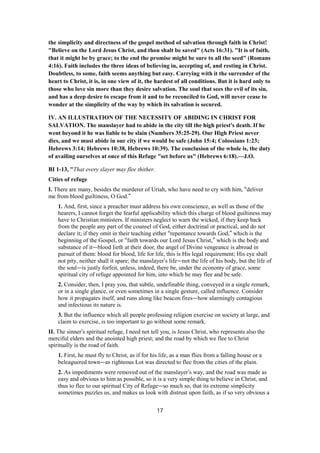


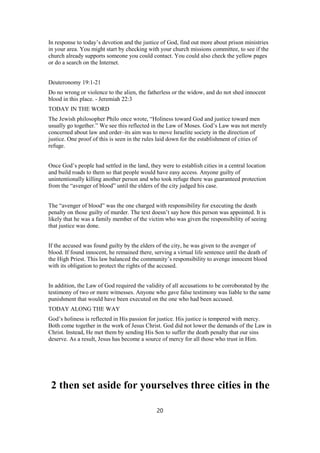

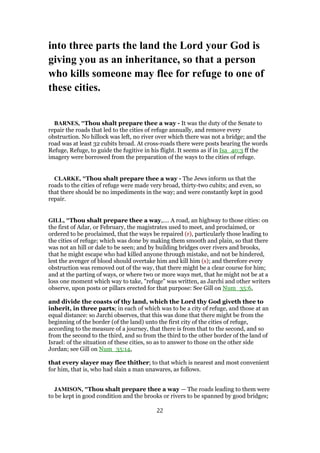

![forever sounding in our ears. Oh!, for grace to flee unto thee, thou LAMB of GOD
which takest away the sin of thy people. Romans 10:8; John 1:29.
LANGE, ". Chap19 Deuteronomy 19:3. Starke: “Thus God prepares the way by His
word and Spirit, and by His servants, to His refuge, His Saviour, that nothing may
prove a hindrance in the way; as he did through John the Baptist, Matthew 3:3. But
Christ is equally near all His servants, Matthew 11:28; John 6:37. Berl. Bib: “How
excellent is the refuge which tempted and troubled sinners have in Him, in whom is the
whole fulness of the Godhead; so that no sin, no law, curse, nor Satan, death or hell, can
reach them ! The finger posts point to Him. John 1:29. But whoever will have safety in
Him must forsake father, mother and all. Psalm 45:10; Luke 14:26.” Wurth. Bib,
Deuteronomy 19:10 : “Magistrates ought not only to punish the guilty, but protect and
save the innocent,” Deuteronomy 19:1-13. The place of refuge in Israel a security, but
no protection for sin.” Deuteronomy 19:14. Piscator: “God cares not only for the body
and life of our neighbor, but for all that is necessary for his abode, and purposes that no
one shall injure another in this respect.” Baumgarten: “With these directions the
prohibition as to the landmark is so far connected, as it also has its deepest ground in
the character of the land as the possession of Jehovah. Hence Moses returns
immediately to the judicial investigation of the murder.” Berl. Bib.: “In Deuteronomy
19:14 to prevent civil wars among His people, God forbids any alteration of the limits,
once fixed by lot in the division of the land. Each family and tribe should keep within its
inheritance.” Osiander, Deuteronomy 19:20. If the magistrates cannot see the heart,
they may prevent the crime from becoming common.
PULPIT, "Thou shalt prepare thee a way. In the East, the roads were for the most part
mere tracks made by the feet of animals used as beasts of burden or for traveling; and
this continues to be the case in Palestine and many other parts of the East even at the
present day. That roads, however, properly so called, were not unknown to the
Hebrews, even in early times, is evident, not only from this passage, but also from Le
26:22; Numbers 20:17; Numbers 21:22; Deuteronomy 2:27; 1 Samuel 6:12. The design
of the injunction here was that every facility should be afforded to the fugitive to escape
to the place of refuge. In later times, it was enacted that the roads leading to these cities
should be repaired every year in the month Adar, and every obstruction removed.
TRAPP, "Deuteronomy 19:3 Thou shalt prepare thee a way, and divide the coasts of
thy land, which the LORD thy God giveth thee to inherit, into three parts, that every
slayer may flee thither.
Ver. 3. Thou shalt prepare thee a way.] A direct, plain, fair highway: such a way must
ministers prepare and pave for their people to Christ, the true asylum, by giving them
"the knowledge of salvation by the remission of their sins." [Luke 1:76-77]
24](https://image.slidesharecdn.com/deuteronomy19commentary-160203031943/85/Deuteronomy-19-commentary-24-320.jpg)
![4 This is the rule concerning anyone who kills a
person and flees there for safety—anyone who
kills a neighbor unintentionally, without malice
aforethought.
GILL, "And this is the case of the slayer, which shall flee thither, that he
may live,.... It was not any slayer that might have protection in these cities, but such
who were thus and thus circumstanced, or whose case was as follows:
whoso killeth his neighbour ignorantly; without intention, as the Targum of
Jonathan, did not design it, but was done by him unawares:
whom he hated not in time past; had never shown by words or deeds that he
had any hatred of him or enmity to him three days ago; so that if there were no marks
of hatred, or proofs of it three days before this happened, it was reckoned an
accidental thing, and not done on purpose, as this phrase is usually interpreted; see
Exo_21:29.
COFFMAN""Blood revenge was the police of the primitive Aryan and Semitic
peoples."[7] It is important to notice that the Jews were not to change everything in
their new place of residence. The ancient police system which featured the avenger of
blood would continue to be used, but with the restraints and precautions inherent in the
refuge system. In a similar way, the ancient landmarks in use for ages before Israel
inherited Canaan were to be continued and honored. (See under Deuteronomy 19:14.)
Under the avenger of blood system, any homicide gave the right to the next of kin to
seek out the manslayer and kill him. In fact, it was considered a solemn duty for him to
do so. The whole system of the cities of refuge was not designed to interfere with that
arrangement at all, except in those cases where the killing was accidental, unintentional,
and not premeditated.
In Deuteronomy 19:8,9, Moses instructed the people to set up three more cities of
refuge, in addition to the six already commanded, IF God should enlarge their borders,
as God had sworn to their fathers that he would do IF they remembered to keep all of
God's commandments. Note that God's promise to enlarge their borders was
conditional (Deuteronomy 19:9), and also that the instruction to appoint three more
cities of refuge was conditional (Deuteronomy 19:8). The significant thing about these
instructions is that it would have been impossible, long after the times of Moses, for
anyone whomsoever to have included such orders as these! "No late author would have
invented such a provision."[8] Not only did God never really enlarge Israel's borders
until the times of David and Solomon, but even in their times, the conquered area was
not really incorporated into Israel, but merely made tributary to Israel's monarchy,
and furthermore, the conquered peoples quickly regained their independence when
25](https://image.slidesharecdn.com/deuteronomy19commentary-160203031943/85/Deuteronomy-19-commentary-25-320.jpg)
![Solomon's incompetent son (Rehoboam) inherited the throne.
Oberst summarized the instruction regarding the cities thus: "The appointment of the
six was WHEN, but the appointment of the other three was IF; and the job apparently
never got done!"[9]
Deuteronomy 19:4-7 lays out instructions for the unintentional manslayer; and
Deuteronomy 19:5,6 gives an example of what was meant by unintentional. Also, in
Numbers 35:26-24, there are other examples of inadvertent homicide.
TRAPP, "Deuteronomy 19:4 And this [is] the case of the slayer, which shall flee thither,
that he may live: Whoso killeth his neighbour ignorantly, whom he hated not in time
past;
Ver. 4. Whom he hated not in time past.] There is, first, a passion of hatred. This is a
kind of averse ness and rising of the heart against a man, when one sees him, so that he
cannot away with him, nor speak to him, nor look courteously or peaceably upon him,
and by his goodwill he would have nothing to do with him. Secondly, there is a habit of
hatred, when the heart is so settled in this alienation and estrangement, that it grows to
wish, and desire, and seek his hurt. Both these must be mortified.
5 For instance, a man may go into the forest
with his neighbor to cut wood, and as he swings
his ax to fell a tree, the head may fly off and hit
his neighbor and kill him. That man may flee to
one of these cities and save his life.
BARNES, "With the axe - literally, “with the iron.” Note the employment of iron
for tools, and compare Deu_3:11 note.
GILL, "As when a man goeth into the wood with his neighbour to hew
wood,.... A wood is a place common to men, and cutting down wood a business
which any man might do; whereas a private place, where a man had no right to be,
and doing what he had no business with, rendered a case suspicious, and such a man
was liable to be taken up when any affair happened of the kind here spoken of; so the
Jewish writers observe (t),"a wood is a public place for him that hurts and him that is
hurt to enter there;''both had a right to go thither, the one as well as the other, he to
26](https://image.slidesharecdn.com/deuteronomy19commentary-160203031943/85/Deuteronomy-19-commentary-26-320.jpg)

![high-priest died. But our High-priest never dies. "He ever liveth to make intercession
for us."
E. M. Goulburn, Sermons Preached in the Parish Church of Holywell, p. 101.
TRAPP, "Deuteronomy 19:5 As when a man goeth into the wood with his
neighbour to hew wood, and his hand fetcheth a stroke with the axe to cut down
the tree, and the head slippeth from the helve, and lighteth upon his neighbour,
that he die; he shall flee unto one of those cities, and live:
Ver. 5. And live.] So he keep within his city of refuge till the death of the high
priest. {See Trapp on "Numbers 35:25"}
6 Otherwise, the avenger of blood might pursue
him in a rage, overtake him if the distance is too
great, and kill him even though he is not
deserving of death, since he did it to his
neighbor without malice aforethought.
GILL, "Lest the avenger of blood pursue the slayer,.... These words are to be
connected with Deu_19:3, where it is ordered to prepare the way to the cities of
refuge, and to divide the land into three parts, for the convenience of the slayer to flee
thither, lest he that was next of kin, and incensed against the slayer, and determined
to avenge what was done, should pursue after him:
while his heart is hot; by reason of the loss of his relation, upon which his
passions being raised, his heart becomes inflamed with wrath and anger; which
pushes him upon an eager and hasty pursuit of the slayer, before he sits down and
coolly considers and deliberates on the affair:
and overtake him, because the way is long, and slay him; wherefore it was
proper that everything should be done to make the way to these cities as easy and as
short as it could be:
whereas he was not worthy of death; had not committed an action deserving of
it, it being done ignorantly and without notice, as follows:
28](https://image.slidesharecdn.com/deuteronomy19commentary-160203031943/85/Deuteronomy-19-commentary-28-320.jpg)
![inasmuch as he hated him not in time past; See Gill on Deu_19:4.
JAMISON 6-7, "Lest the avenger of the blood pursue the slayer, while his
heart is hot — This verse is a continuation of Deu_19:3 (for Deu_19:4, Deu_19:5,
which are explanatory, are in a parenthetical form), and the meaning is that if the
kinsman of a person inadvertently killed should, under the impulse of sudden
excitement and without inquiring into the circumstances, inflict summary vengeance
on the homicide, however guiltless, the law tolerated such an act; it was to pass with
impunity. But to prevent such precipitate measures, the cities of refuge were
established for the reception of the homicide, that “innocent blood might not be shed
in thy land” (Deu_19:10). In the case of premeditated murder (Deu_19:11, Deu_
19:12), they afforded no immunity; but, if it were only manslaughter, the moment the
fugitive was within the gates, he found himself in a safe asylum (Num_35:26-28;
Jos_20:6).
TRAPP, "Deuteronomy 19:6 Lest the avenger of the blood pursue the slayer, while his
heart is hot, and overtake him, because the way is long, and slay him; whereas he [was]
not worthy of death, inasmuch as he hated him not in time past.
Ver. 6. While his heart is hot.] As Nebuchadnezzar’s oven - viz., with anger and grief,
and such like passions; which, like heavy bodies down steep hills, once in motion move
themselves, and know no ground but the bottom.
7 This is why I command you to set aside for
yourselves three cities.
GILL, "Wherefore I command thee, saying, thou shalt separate three
cities for thee. This was to be done immediately, as soon as they were settled in the
land of Canaan, and established in the possession of it, the inhabitants being cut off,
or driven out, or however subdued.
8 If the Lord your God enlarges your territory,
as he promised on oath to your ancestors, and
29](https://image.slidesharecdn.com/deuteronomy19commentary-160203031943/85/Deuteronomy-19-commentary-29-320.jpg)

![promise was never accomplished, so that there was no need for three more cities of
refuge. This the Jewish writers themselves own. “Yet the holy blessed God,” say they,
“did not command it in vain, for in the days of Messiah the Prince, they shall be
added.” They expect it in the letter: but we know it has in Christ its spiritual
accomplishment. For the borders of the gospel Israel are enlarged according to the
promise: and in the Lord our righteousness, refuge is provided for all that by faith flee
to him.
HAWKER, "Verses 8-10
It is worthy remark, that this precept of forming three cities more, in case of the
enlargement of Israel's borders, was never fulfilled as it respected Israel only. But, had
it not an eye to the enlargement of the church, when both Jew and Gentile were brought
into one? See Isaiah 54:2-3. And in this sense was not the precept intended to show, that
the cities of refuge were as many to the Gentiles as to the Jews, and all typically
referred to one and the same blessed object? Colossians 1:20.
PULPIT, "Deuteronomy 19:8, Deuteronomy 19:9
In case their land should be extended, in ease they should come to possess the whole
territory promised by God to the patriarchs, so that their domain should reach from the
Nile to the Euphrates (Genesis 15:18)—an event which should be realized only if they
should continue steadfast in their obedience to all that God had enjoined upon them,
and an event which in point of fact never was realized, for even under David and
Solomon there were extensive territories within these limits which were not
incorporated with the kingdom of Israel—in that case they were to add other three
cities of refuge to those already appointed.
TRAPP, "Deuteronomy 19:8 And if the LORD thy God enlarge thy coast, as he hath
sworn unto thy fathers, and give thee all the land which he promised to give unto thy
fathers;
Ver. 8. And give thee all the land.] From Nile to Euphrates; [Genesis 15:18] which by
reason of their sins he never did. Pray we with Jabez, [1 Chronicles 4:10] "Oh that thou
wouldest bless me indeed, and enlarge my coast (my heart), and that thine hand might
be with me," &c. "When thou shalt have enlarged mine heart," saith David, "then will
I run the way of thy commandments." [Psalms 119:32]
9 because you carefully follow all these laws I
command you today—to love the Lord your
God and to walk always in obedience to him—
31](https://image.slidesharecdn.com/deuteronomy19commentary-160203031943/85/Deuteronomy-19-commentary-31-320.jpg)

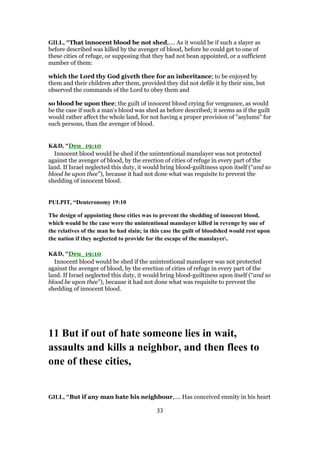


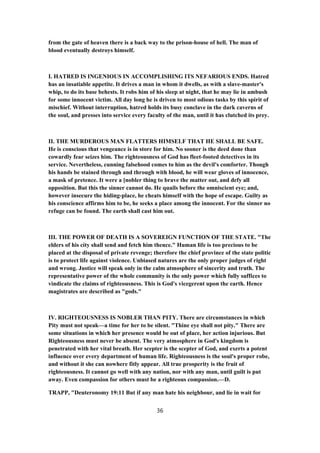
![him, and rise up against him, and smite him mortally that he die, and fleeth into one of
these cities:
Ver. 11. But if any man hate his neighbour.] As Cain did Abel, as Esau Jacob, as
Absalom Amnon; as Dr Story did Queen Elizabeth, whom he cursed daily in his grace
at board; (a) as Tyrone did the English, strangling some of his own men for no other
reason but because they fed on English bread; howbeit he never spake of the queen but
with honour; yea, the profane wretch styled himself cousin to God, enemy to all the
world, and friend to the Queen of England. (b)
WHEDON, "11-13. But if any man hate — The appointment of cities of refuge was a
merciful provision for the security of those who unintentionally should shed blood. The
usage in the time of Moses evidently was the carrying out rigorously the law of
retaliation. But if life had been taken without malice this provision for cities of refuge
afforded a place of escape from the avenger of blood. But they were not to be places of
refuge for murderers. They were not to protect those who had slain their fellow-men
through hatred or for gain. Such guilty ones were to be taken from the cities by the
magistrates and given up to the avenger of blood. Human life was sacred among the
Hebrews. We see how carefully it was protected, how stringent was the legislation.
Moses made provision for the protection of property also.
12 the killer shall be sent for by the town elders,
be brought back from the city, and be handed
over to the avenger of blood to die.
GILL, "Then the elders of his city shall send and fetch him thence,.... The
Targum of Jonathan is,"the wise men of his city,''the sanhedrim, or court of
judicature, or at least the civil magistrates of that city, to which such a murderer
belonged, had a power to send to the city of refuge whither he was fled, and demand
the delivering of him up to them, that his case might be tried before them, and it
might appear whether he was a proper person to receive the benefit of the city of
refuge or not, and if not, to pass sentence of death upon him, and see it executed as
follows:
and deliver him into the hand of the avenger of blood, that he may die;
that is, after the examination and trial of him, and when he is found guilty, and
sentence is passed upon him, then he was to be delivered into the hands of the
avenger of blood, to be the executioner of that sentence.
37](https://image.slidesharecdn.com/deuteronomy19commentary-160203031943/85/Deuteronomy-19-commentary-37-320.jpg)



![them. Let every man be content with his own lot, and just to his neighbours, and then
we shall have no land-marks removed. (2.) It forbids the sowing of discord among
neighbours, and doing any thing to occasion strife and law-suits, which is done (and
it is very ill done) by confounding those things which should determine disputes and
decide controversies. And, (3.) It forbids breaking in upon the settled order and
constitution of civil government, and the altering of ancient usages without just
cause. This law supports the honour of prescriptions. Consuetudo facit jus - Custom
is to be held as law.
JAMISON, "Deu_19:14. The landmark is not to be removed.
Thou shalt not remove thy neighbour’s landmark, which they of old
have set in thine inheritance — The state of Palestine in regard to enclosures is
very much the same now as it has always been. Though gardens and vineyards are
surrounded by dry-stone walls or hedges of prickly pear, the boundaries of arable
fields are marked by nothing but by a little trench, a small cairn, or a single erect
stone, placed at certain intervals. It is manifest that a dishonest person could easily
fill the gutter with earth, or remove these stones a few feet without much risk of
detection and so enlarge his own field by a stealthy encroachment on his neighbor’s.
This law, then, was made to prevent such trespasses.
CALVIN, "A kind of theft is here condemned which is severely punished by the laws of
Rome; (105) for that every one’s property may be secure, it is necessary that the land-
marks set up for the division of fields should remain untouched, as if they were sacred.
He who fraudulently removes a landmark is already convicted by this very act, because
he disturbs the lawful owner in his quiet possession of the land; (106) whilst he who
advances further the boundaries of his own land to his neighbor’s loss, doubles the
crime by the deceptive concealment of his theft. Whence also we gather that not only
are those thieves, who actually carry away their neighbor’s property, who take his
money out of his chest, or who pillage his cellars and granaries, but also those who
unjustly possess themselves of his land.
COFFMAN, ""Which they of old time have set ..." Moses is here speaking of the
landmarks that already existed in Canaan at the time he spoke and before Israel had
even entered the land. Wright and others misunderstand the passage totally, affirming
that "they of old time," is a reference to the early fathers of Israel who established
landmarks when the land was divided, and that, therefore, this passage is "an
indication that the author is living at a considerably later time,"[10] than the times of
Moses. Such allegations are without any merit whatever. This verse is parallel to
Deuteronomy 19:1-13, where the ancient customs of "blood revenge" are incorporated,
with certain precautions, into the law of Israel. This verse means that, upon entering
Canaan, the ancient landmarks already there will continue to be honored as recognized
boundaries.
The big thing in this, of course, is the right of property. The collectivist deceivers of our
generation have attempted to make mileage out of their lying cliche that, "We stress
people rights versus property rights!" But the glaring truth is that there are never any
PEOPLE rights unless also there are PROPERTY rights. Property is the ability to
maintain and support life, and there has never been discovered by any human society
41](https://image.slidesharecdn.com/deuteronomy19commentary-160203031943/85/Deuteronomy-19-commentary-41-320.jpg)
![any way to get rid of property rights. In the communist lands, property has been
confiscated and monopolized by the state, but that does not get rid of PRIVATE
PROPERTY. One may reduce private property to a slip of paper authorizing one to
stand in line, change his address, receive food, or anything else, but then that piece of
paper becomes private property, without which its owner cannot live. The true religion
has always recognized the rights of private property, with the precautionary truth that
all property is "owned" by the children of God as "stewards of God's grace," and that
they are responsible for its use in some manner pleasing to God. The Decalogue clearly
recognizes the right and the responsibility of private property.
The moving of "landmarks" envisioned in this verse refers to the stealing of another's
land by moving the boundary, and, historically, all lands had established landmarks by
which the transfer of lands from person to person and from generation to generation
was protected. Moses was not here speaking of boundaries that would be set up for the
first time by Israelites. As Alexander said, "The law here was given while Israel was yet
outside of Canaan,[11] and "they of old time," cannot possibly refer to Israelites who
would set up landmarks after entering the promised land.
"This kind of law was known to the Greeks, their landowners being protected by Zeus
Horios; Latin landholders were protected by the Roman God Terminus, in whose honor
the annual festival of Terminalia was held. The rights of private property and the
passing of heritage are presupposed in Deuteronomy. But this right, in every age, is
derived from society, and those who enjoy the right should never forget the duty to
society which the possession of such rights imposes upon the owners of private
property."
BENSON, "Deuteronomy 19:14. Thou shalt not remove thy neighbour’s land-mark —
Having provided for the preservation of the lives of innocent persons against such as
might be disposed to take them away, he proceeds to give a charge for securing every
man’s right and property in other matters; and especially forbids all encroachments
upon boundaries of lands and estates. Josephus considers this as a prohibition, not only
against removing any land-mark of an Israelite, but also any that might distinguish
their territories from those of any of the neighbouring nations, with whom they might
be at peace, the breaking in upon these bounds being generally the occasion of wars and
insurrections, which arise from the covetousness of men, who would thus fraudulently
enlarge their possessions.
CONSTABLE, "Witnesses 19:14-21
The previous pericope alluded to the need for witnesses, and this one explains their role.
A common cause of hostility between individuals that sometimes led to homicide was a
failure to agree on common boundaries and to respect property rights (cf. 1 Kings
21:1-26; 1 Kings 22:37-38). [Note: Kaufman, p. 137.] In the ancient world boundary
markers protected the property rights of individuals (Deuteronomy 19:14). Many
nations as well as Israel regarded them as sacred. Stones several feet high marked the
boundaries of royal grants. [Note: Kline, "Deuteronomy," p. 182.] The Romans later
executed people who moved boundary markers. [Note: Keil and Delitzsch, 3:399.]
Tribal boundaries were particularly significant in the Promised Land because Yahweh,
42](https://image.slidesharecdn.com/deuteronomy19commentary-160203031943/85/Deuteronomy-19-commentary-42-320.jpg)
![the owner of the land, determined them.
In Israel judges assumed a person was innocent until proven guilty. Deuteronomy
19:15-21 explain what they were to do if they suspected some witness of giving false
testimony. Normally at least two witnesses were necessary (Deuteronomy 17:6), but
sometimes there was only one. In such a case the trial moved to the supreme court at
the tabernacle (Deuteronomy 19:17; cf. Deuteronomy 17:8-13). False witnesses received
the punishment they sought to bring on the persons they falsely accused (Deuteronomy
19:19;J. Fisher, "Lex Talionis in the Bible and Rabbinic Tradition," Journal of
Ecumenical Studies 19:3 (Summer 1982):582-87.] God here extended to all criminals
the safeguards formerly guaranteed to capital offenders. Jesus did not deny the validity
of this principle for the courtroom, but He forbade its application in interpersonal
relationships (Matthew 5:38-42).
God's concern for His people's lives, possessions, and reputations stands out in this
chapter.
ELLICOTT, "(14) Thou shalt not remove thy neighbour’s landmark.—Another law
manifestly appropriate here, where it appears for the first time, like the “field” in the
tenth commandment (Deuteronomy 5:21). But the immediate connection is not obvious.
Perhaps the idea is to caution the people to avoid a most certain incentive to hatred and
murder. Ancient landmarks are also important and almost sacred witnesses.
They of old time.—The first dividers of the land. There is no idea of antiquity about the
expression.
LANGE, " Deuteronomy 19:14. It is characteristic for the Mosaic view of the wife as a
possession, that the discourse passes over the seventh command, and in Deuteronomy
19:14 comes on the contrary to speak of the eighth command, from the point of view of
the sixth command, i.e., of the earthly life. Thus light is thrown upon the eighth
command from the application of the sixth; significant both for Deut. and for the total
view of the law.—Each district, as it comes into your inheritance, with thy neighbors as
with thine own, is thus connected with the family life, and comprises its livelihood; the
lessening or disturbance of these limits is simply a question of existence therefore. The
possession, particularly the landed, is the ground which yields to man its produce for
his support. Thus it shares in the sacredness of life, which is preserved by it; entirely
like Deuteronomy 20:19-20. The penalty of the offence is hinted, Deuteronomy 27:17.
They of old. Schroder, predecessors. Either in time, and thus also in succession, or in
honor, the leaders. What the first possessors, the fathers, Joshua and the renowned
elders, determined, should be observed down to the most distant future. Comp. still
upon Deuteronomy 19:3 and Intro, § 4, I:17. [They of old time, is an unfortunate
rendering, as it seems to imply a long residence in Canaan, when this direction was
given. The original contains no such intimation. It is the heads, chiefs. Vulg, priores.
The immediately following clauses make it clear that the direction was given while the
land was not yet in possession.—A. G.].
PULPIT, “To the ordinance concerning cities of refuge Moses appends one prohibiting
the removing of landmarks; if these had been placed by a man's ancestors to mark the
boundaries of possessions, they were not to be surreptitiously altered. Landmarks were
43](https://image.slidesharecdn.com/deuteronomy19commentary-160203031943/85/Deuteronomy-19-commentary-43-320.jpg)
![held sacred, and a curse is pronounced against those who remove them (Deuteronomy
27:7; cf. Job 24:2; Proverbs 22:28; Proverbs 23:10; Hosea 5:10). Among other nations
also landmarks were regarded as sacred.
Deuteronomy 19:14
They of old time; i.e. those of a former age. The word does not necessarily imply that
the age described as "former" was removed at a great distance in the past; it might
designate men of the immediately preceding age. The LXX. have here ן̔ינבפ́וסוע , and the
Vulgate priores. That the law here given was uttered whilst Israel was yet outside of
Canaan, is evident from what follows in this verse.
TRAPP, "Deuteronomy 19:14 Thou shalt not remove thy neighbour’s landmark, which
they of old time have set in thine inheritance, which thou shalt inherit in the land that
the LORD thy God giveth thee to possess it.
Ver. 14. Thy neighbour’s landmark, which they of old, &c.] Erasmus met with an
adversary so silly, as to object unto him this text against the new translation of the New
Testament: Quasi per terminos, voces intellexisset Spiritus Sanctus atque huius legis
violatae illi postulari possent, qui mutant rerum vocabula, (a) Whereas by terms or
"landmarks" hero are clearly meant bounds, borders, limits, whereby every man’s
inheritance was severed.
PULPIT, "Deuteronomy 19:14
Caution against fraud.
Nothing that concerns man's welfare and joy is beneath God's care. The vast extent of
his kingdom hinders not his guardianship ever every minute interest of his creatures.
Even landmarks, boundary stones, are under his protection.
I. GOD IS TO BE RECOGNIZED AS THE ABSOLUTE PROPRIETOR OF ALL
THINGS. As the Creator and Upholder of the universe, he has supreme claim to this
solid globe. "The earth is the Lord's" Nor has he ever parted with his rightful claim, for
he keeps the globe hourly in existence, and so continually proclaims his control over it.
It is his gift to men, not in the sense that he has transferred all his rights to others, but
only in the sense that we were unable to purchase from him. We hold every possession
from him in trust, and are bound by such terms and conditions as his will may impose.
II. IT IS GOD'S WILL THAT LAND SHOULD BE DISTRIBUTED AS PERSONAL
ESTATE. Although evils result from the division of the land into personal property,
greater evils would result from communal or indiscriminate possession. The fields
would not be well cultured. The land would not yield her prolific plenty. Dispute and
strife would be the chronic state of society. Personal property is essential to healthy life
in the State. Yet men are stewards, and not absolute proprietors.
44](https://image.slidesharecdn.com/deuteronomy19commentary-160203031943/85/Deuteronomy-19-commentary-44-320.jpg)


![testimony of two or three witnesses.
GILL, "One witness shall not rise up against a man for any iniquity, or for
any sin, in any sin that he sinneth,.... Whether capital sins, or pecuniary debts;
or whatsoever sins a man may be guilty of whether sins against the first or second
table of the law, whether greater or lesser sins, whether in moral or civil things; the
Jews except only in the case of a woman suspected of adultery and of beheading the
heifer:
at the mouth of two witnesses, or at the mouth of three witnesses, shall
the matter be established; either for acquittance or condemnation; and the
witnesses may not, as Jarchi says, write their testimony in a letter, and send it to the
sanhedrim, nor may an interpreter stand between the witnesses and the judges; See
Gill on Deu_17:6.
JAMISON, "Deu_19:15. Two witnesses required.
One witness shall not rise up against a man for any iniquity — The
following rules to regulate the admission of testimony in public courts are founded
on the principles of natural justice. A single witness shall not be admitted to the
condemnation of an accused person.
COFFMAN, "Here are the instructions regarding witnesses. Paramount in this
connection is that nothing shall be decided upon the testimony of a single witness.
Christ himself appealed to this principle, pointing out that John the Baptism was a
witness of Himself, that the Father in heaven was another witness, that the very works
which Christ did constituted a witness, and that He of necessity bore witness of himself,
being indeed "The Light of the World," because, in the very nature of light, it must
bear witness of itself!
"One witness shall not rise up against a man ..." Orlinsky stated that a better rendition
of this clause is, "One witness shall not validate any matter against another."[13]
"Diligent inquisition ..." (Deuteronomy 19:18). "This was to be no resort to ordeal, as in
the customs of legal practice among Israel's neighbors."[14] As a matter of fact, the
Jewish judges became very skilled in carrying on such inquisitions, and they learned
how to grill and cross-examine witnesses in such a manner as to expose the pretensions
of false witnesses. For example, there is the legendary example of Daniel who exposed
two false witnesses who conspired to condemn a Jewish maiden for adultery, when, as a
matter of fact, it was merely their attempt to vent their hatred against the maiden who
stubbornly refused to commit adultery with either one of them. They had accused her
of this crime which allegedly was committed under a tree. Daniel separated the
witnesses, asked them, by turns, what kind of tree it was, and when their testimony did
not agree, procured the condemnation of both the accusers!
Deuteronomy 19:21 is commonly called the "Lex Talionis," but as Blair wrote: "Eye for
eye justice, while not in good repute among most Christians, was actually an attempt to
limit vengeance to equitable proportions."[15] Under the law of the jungle, vengeance
47](https://image.slidesharecdn.com/deuteronomy19commentary-160203031943/85/Deuteronomy-19-commentary-47-320.jpg)

![generally. ְב the concrete case. Comp. Deuteronomy 17:6. In the second place, in the
special case of “false witness,” Moses places life for life, in any case the like punishment.
Deuteronomy 19:16. Treats a peculiar case; a witness of violence, who will do violence
to his neighbor by his testimony, ָהנָﬠ designates both the beginning and the reply in
conversation, hence; to answer before the court in regard to any falling away (comp.
Deuteronomy 13:6; Deuteronomy 17:7) from God, or the law. The suspicion against the
witness has been proven in the lower court, as the Talmud understands ה ָר ָס of a case
which was far off from the witness, strange to him, since he cannot prove his presence
at it. Deuteronomy 19:17. Comp. Deuteronomy 17:8 sq, an example of the causes which
were difficult or hard. [Both the men, the parties to the original suit. Before Jehovah
cannot be, as Knobel, the lower court. The false witness was borne in the court below,
and now comes before the supreme court at the sanctuary.—A. G.]. Deuteronomy 19:18
as Deuteronomy 13:15. Deuteronomy 19:20. Comp. upon Deuteronomy 13:12
( Deuteronomy 17:13). It is not the punishment as such, which is the means of alarm,
but that before Jehovah the purpose, is as the deed ( Deuteronomy 19:19) and generally
the decided earnestness of the lextalionis, as it is solemnly and impressively announced
in Deuteronomy 19:21. ( Exodus 21:23 sq.; Leviticus 24:19 sq.). The rest as in
Deuteronomy 19:13.
PULPIT, “To secure against injury to life or property through inadequate or false
attestation, it is enacted that more than one witness must appear before anything can be
established; and that, should a witness be found on trial to have testified falsely against
his neighbor, he was to be punished by having done to him what he thought to have
done to his neighbor (cf. Deuteronomy 17:6; Numbers 35:30).
Deuteronomy 19:15
The rule in Deuteronomy 17:6, regarding accusations of idolatry, is here extended to
accusations of every kind before a court of justice; a single witness was not to be
admitted as sufficient to convict a man of any offence, either civil or criminal.
PULPIT, "Deuteronomy 19:15-21
Bulwark against perjury.
"The tongue is an unruly member, and cannot easily be restrained." Private slander is
base enough, but its basest utterance is when, in the sacred halls of justice, it swears
away a man's reputation or his life. It is doubtful if a deed so black is done in hell.
I. PERJURY IS SO COMMON AS TO NECESSITATE A PUBLIC STIGMA ON
HUMANITY. "One witness shall not rise up against a man." If every man had been
known as truthful, the testimony of one witness on any accusation would be ample. The
narration of one eye-witness or ear-witness ought to be enough. For a truthful man
would always speak within the limits of truth, and would promptly express his doubt, if
49](https://image.slidesharecdn.com/deuteronomy19commentary-160203031943/85/Deuteronomy-19-commentary-49-320.jpg)

![iniquity, or for any sin, in any sin that he sinneth: at the mouth of two witnesses, or at
the mouth of three witnesses, shall the matter be established.
Ver. 15. One witness shall not rise up.] Yet, if this one be a faithful witness, Mαρτυς δε
πιστος, και εις χρησιμος, saith Aristotle; (a) one faithful witness in some case may
suffice, in private offences howsoever: and that our Saviour speaketh of such, [Matthew
18:19] Basil and others are of opinion; if thy brother, a Jew, shall trespass against thee,
being a Jew, right thyself by degrees. (1.) Deal with him fraternally, "tell him his fault
betwixt thee and him alone"; [Matthew 18:15] (2.) Deal with him legally, "take with
thee one or two more"; [Deuteronomy 19:15] (3.) Deal with him Jewishly; "tell the
Church," [Deuteronomy 19:17] complain to the Sanhedrim; (4.) If he shall neglect to
hear them, deal with him heathenishly, i.e., " let him be unto thee as a heathen and a
publican"; make benefit of Roman sovereignty, let Caesar’s justice end the difference
between you. (b)
16 If a malicious witness takes the stand to
accuse someone of a crime,
BARNES, "Testify against him that which is wrong - Margin, more literally,
“a falling away.” The word is used Deu_13:5 to signify apostasy or revolt; here it is no
doubt to be understood in the wider sense of any departure from the Law.
GILL, "If a false witness rise up against any man,.... In a court of judicature:
to testify against him: that which is not true of him, let it be in what case it will;
Aben Ezra instances in idolatry, but it holds good of any other.
JAMISON, "Deu_19:16-21. Punishment of a false witness.
But if convicted of perjury, it will be sufficient for his own condemnation, and his
punishment shall be exactly the same as would have overtaken the object of his
malignant prosecution. (See on Exo_21:23; see also Lev_24:20).
CALVIN, "16.If a false witness rise up against any man. Because the fear of God does
not so prevail in all men, as that they should voluntarily abstain from the love of
slander, God here appoints the punishment to be inflicted for perjury: for political laws
are enacted against the ungodly and disobedient, in order that those who despise God’s
judgment should be brought before the tribunal of men. Although perjury is not here
ordained to be tried before the judges, unless there should be an accuser, who should
51](https://image.slidesharecdn.com/deuteronomy19commentary-160203031943/85/Deuteronomy-19-commentary-51-320.jpg)

